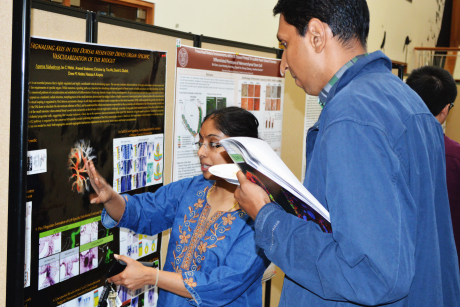Stem cell research on campus grows after $3M boost
By Carly Hodes

Unlocking knowledge about how organisms develop and repair, stem cell research holds great promise for future therapies for injuries and conditions, from infertility and Alzheimer’s to heart failure and cancer. As part of its mission to promote cross-campus interactions and enhance training in stem cell biology at Cornell, the Cornell Stem Cell Program (CSCP) held its second Stem Cell Retreat May 17 on campus.
About 85 members of the Cornell stem cell research community attended the event, which featured keynote speaker Dr. Lawrence Goldstein, director of the Stem Cell Program at University of California, San Diego, and the Howard Hughes Medical Institute, speaking on using stem cells to treat Alzheimer’s disease.
“Stem cell research involves a wide breadth of disciplines,” said Dr. Alexander Nikitin, professor of pathology at Cornell’s College of Veterinary Medicine and leader of CSCP. “This retreat is one example of how we’ve been able to foster the communications and collaborations across fields necessary to more fully understand and harness the potential of stem cells.”
More than 40 laboratories at Cornell are affiliated with CSCP. Its faculty is supported by more than $42 million in research funding devoted to projects with major stem cell and regenerative medicine components. Coordinating activities of investigators involved in stem cell research, the CSCP provides resources for stem-cell research, promotes cross-campus interactions, and enhances teaching and training in stem cell biology.
Recently CSCP researchers Professor John Schimenti and Nikitin received $3 million from the New York State Stem Cell Science program of the New York State Department of Health to support the Stem Cell Modeling and Phenotyping Core.
The core expands existing mammalian reprogramming and transgenesis facilities and adds new components, such as genomic editing, stem cell pathology and stem cell optical imaging. Thus it provides state-of-the art capabilities for scientists to generate stem cells, modify genes in highly specific ways, create transgenic research animal models for basic and clinical research, analyze pathology of these animal models with high diagnostic and microscopic resolution, and study individual stem cells in live animals or in man-made environments.
The core consists of the Stem Cell and Transgenics Core Facility (directed by Schimenti), the Core Stem Cell Pathology Unit (directed by Nikitin) and the Core Stem Cell Optical Imaging Unit (directed by Associate Professor Warren Zipfel). Their combined resources and services integrate advanced animal modeling and phenotyping, the study of how genes affect physical traits.
In the last year CSCP-affiliated faculty members have published 130 manuscripts, including 53 that resulted directly from travel awards and seed funding from CSCP, and were published in such renowned journals as Nature, Science, Developmental Cell and PNAS. In 2013 CSCP gave seven travel awards and two seed grants to spur research, and hosted six seminars by invited stem cell experts and nine Stem Cell Work in Progress meetings, at which investigators from labs from across campus gather to share current work.
Carly Hodes ’10, MBA ’15, is a communication specialist at the College of Veterinary Medicine.
Media Contact
Get Cornell news delivered right to your inbox.
Subscribe